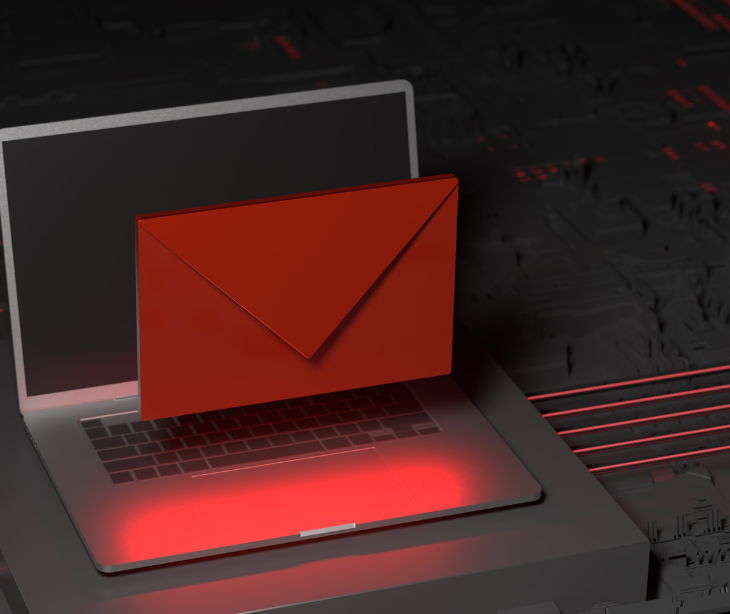5 min read
How HIPAA compliant email helps grow healthcare businesses
Tshedimoso Makhene
May 30, 2024

HIPAA compliant email can benefit healthcare businesses by ensuring the safe management of patient data, reducing documentation requirements, and boosting prompt communication.
Understanding HIPAA compliance
HIPAA is a federal law designed to ensure the protection and confidential handling of protected health information (PHI). HIPAA compliance involves adhering to rules and regulations that mandate secure methods for storing, accessing, and transmitting patient information. For email communication, this means using encryption, secure access controls, and regular monitoring to prevent unauthorized access and data breaches.
How HIPAA compliant email can boost your healthcare business
Building patient trust and satisfaction
Confidential communication
Patient trust is fundamental to the success of any healthcare business. When patients believe that their personal health information is secure, they are more likely to engage openly with their healthcare providers. HIPAA compliant email ensures that all patient information transmitted is encrypted and secure, which builds confidence in the provider's commitment to privacy.
Streamlined communication
Efficient communication between patients and healthcare providers is essential for timely and effective care. HIPAA compliant email allows for seamless and secure exchanges of information, such as appointment reminders, treatment plans, and follow-up care instructions. This improved communication enhances patient experience by making it easier for them to stay informed and engaged with their healthcare.
For example, a patient with chronic conditions can receive regular updates and reminders about medication schedules, upcoming appointments, and lifestyle tips through secure emails.
Enhancing operational efficiency
Seamless information sharing
A significant advantage of HIPAA compliant email is the ability to share sensitive patient information quickly and securely among healthcare professionals, facilitating better collaboration and coordination.
A patient's care team can communicate and share updates in real time, ensuring that everyone involved has the latest information.
Reducing paperwork
The healthcare industry is notorious for its reliance on extensive paperwork. However, “digital health solutions have radically changed the way patients interact with healthcare professionals and receive treatment. They’ve also reshaped the way patients consume and share medical information and data,” says ApacMed.
HIPAA compliant email can reduce this burden by enabling secure electronic transmission of documents. By digitizing patient records, consent forms, and other critical documents, healthcare providers can save time and resources while minimizing the risk of lost or misplaced information.
This shift has allowed healthcare providers to use HIPAA compliant email to send encrypted digital copies of medical records. This ensures both the confidentiality and speedy processing of information.
Legal and financial protection
Avoiding penalties
Non-compliance with HIPAA regulations can result in significant fines and legal penalties. Healthcare businesses can avoid these penalties by using HIPAA compliant email by ensuring their communication practices adhere to legal standards. By adopting this proactive approach, the business safeguards against financial loss and exhibits dedication to upholding legal and ethical principles.
Audit readiness
HIPAA compliant email systems often include features such as audit logs and secure storage, which make it easier for healthcare businesses to prepare for and pass compliance audits. These features ensure that all communications are recorded and can be reviewed, demonstrating compliance with HIPAA regulations.
Facilitating professional collaboration
Secure collaborations
Effective patient care often requires collaboration among multiple healthcare providers. HIPAA compliant email enables secure communication and information sharing among professionals, ensuring patient information remains confidential while facilitating coordinated care.
Supporting telemedicine
In April 2024, Walmart announced that it would close all 51 Walmart Health centers in five states and shut down its virtual healthcare service. With the closure of Walmart Health, experts “ believe virtual care, or telehealth, will become a larger part of care.”
With the rise of telemedicine, secure communication has become even more critical. HIPAA compliant email ensures that telehealth consultations, follow-ups, and other remote interactions remain confidential and secure.
Enhancing marketing and communication
Secure outreach
HIPAA compliant email marketing enables healthcare businesses to reach out to patients with reminders, newsletters, and health tips securely. This ongoing engagement helps build stronger relationships with patients, fostering loyalty and encouraging regular interaction with healthcare services.
Personalized communication
By safely managing patient data, healthcare providers can tailor their communications to meet the specific needs of their patients. Personalized communication enhances the overall patient experience and can lead to better health outcomes.
Read more: How to balance personalization and privacy for HIPAA compliance
Strengthening reputation management
Building a trustworthy brand
Adhering to HIPAA regulations in email communications demonstrates a commitment to patient privacy and security. This commitment can strengthen a healthcare business’s reputation, making it more attractive to potential patients and partners.
For example, a healthcare provider that consistently uses HIPAA compliant email can highlight this practice in their marketing materials and patient communications. This transparency and dedication to security can differentiate them from competitors and build a strong, trustworthy brand.
Encouraging positive patient reviews
Satisfied patients who trust their healthcare providers with their personal information are more likely to leave positive reviews and refer others. This positive word-of-mouth can drive growth and attract new patients, contributing to the overall success of the healthcare business.
HIPAA compliant email best practices
Use secure email services
-
- Choose a HIPAA compliant email provider: Select an email service provider that offers built-in HIPAA compliance features, such as encryption, secure storage, and access controls. Ensure the provider signs a business associate agreement (BAA).
- Implement encryption: Encrypt emails both in transit and at rest to prevent unauthorized access to sensitive information. Use strong encryption standards, such as AES (Advanced Encryption Standard), to secure data.
See also: What HIPAA says about email encryption
Implement strong access controls
-
- User authentication: Implement multi-factor authentication (MFA) to ensure that only authorized personnel can access email accounts containing PHI. MFA adds an extra layer of security by requiring users to provide two or more verification factors.
- Role-based access: Assign access rights based on user roles within the organization. Limit access to PHI to only those employees who need it to perform their job functions.
Educate and train staff
-
- Regular training: Provide ongoing training for employees on HIPAA regulations and the importance of secure email practices. Ensure that staff members understand how to handle PHI and recognize potential security threats.
- Phishing awareness: Educate employees about phishing scams and how to identify suspicious emails. Implement protocols for reporting and responding to phishing attempts.
Monitor and audit email activity
-
- Regular audits: Conduct regular audits of email communications to ensure compliance with HIPAA standards. Use audit logs to track access and changes to emails containing PHI.
- Real-time monitoring: Implement real-time monitoring tools to detect and respond to suspicious activities, such as unauthorized access or data breaches.
Develop and enforce policies
-
- Email usage policy: Create and enforce a comprehensive email usage policy that outlines the acceptable use and handling of PHI, and procedures for reporting security incidents.
- Data retention policy: Establish a data retention policy for emails containing PHI. Define how long emails should be stored and the procedures for securely deleting them after the retention period.
Ensure secure communication with patients
-
- Patient consent: Obtain patient consent before communicating PHI via email. Ensure that patients understand the risks and benefits of email communication and provide them with secure alternatives if needed.
Use secure email practices
-
- Avoid using personal email accounts: Prohibit the use of personal email accounts for sending or receiving PHI. Ensure that all communications involving PHI are conducted through secure, organization-approved email systems.
- Email content minimization: Minimize the amount of PHI included in email communications. Only share necessary information and avoid including sensitive details in email subject lines.
Backup and Disaster Recovery
-
- Regular backups: Implement regular backups of email data to ensure that information can be recovered in case of a disaster or data loss incident. Ensure that backup systems are secure and compliant with HIPAA standards.
- Disaster recovery plan: Develop a disaster recovery plan that includes procedures for restoring email services and data in the event of a breach or other emergency.
FAQs
What is HIPAA?
The Health Insurance Portability and Accountability Act (HIPAA) establishes national regulations to safeguard the confidentiality and security of specific medical data, commonly referred to as protected health information (PHI). The overarching goal of HIPAA is twofold: protecting each individual's privacy rights in regards to their health-related details and ensuring that electronic exchanges between healthcare providers and insurers are secure. Any violations against these standards could result in severe legal repercussions, including substantial fines or penalties for entities subject to coverage under this Act.
Learn more: What is HIPAA?
Who must comply with HIPAA?
HIPAA applies to covered entities and their business associates. Covered entities include healthcare providers, health plans, and healthcare clearinghouses. Business associates are individuals or entities that perform certain functions or services on behalf of covered entities that involve the use or disclosure of protected health information (PHI).
What constitutes a HIPAA violation in email communication?
A HIPAA violation in email communication can occur if:
- PHI is sent without encryption.
- Emails containing PHI are accessed by unauthorized individuals.
- PHI is disclosed without patient consent or a valid reason.
- Proper safeguards (e.g., access controls, and secure login) are not in place to protect PHI.
- There is a failure to report and respond to a data breach involving PHI.
Go deeper: Understanding HIPAA violations and breaches
Subscribe to Paubox Weekly
Every Friday we'll bring you the most important news from Paubox. Our aim is to make you smarter, faster.






